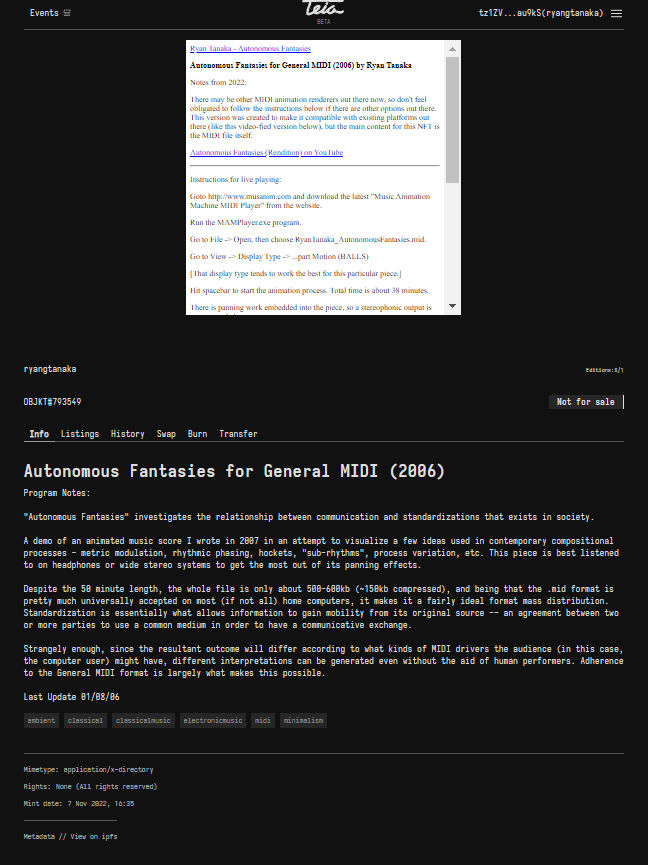
The Shift in Interest From Crypto to AI (And How it will Cycle Back, Sooner Than You Think)
written by ryangtanaka
Crypto was always less about the tech (the "big ideas" in crypto was already possible years ago) but about promoting a culture shift from centralization to decentralization. But I think the industry found out what the biggest bottleneck really was: human nature. Much of the interest in venture capital has moved from crypto to AI at this point, but for this article I'd like to talk about how that's likely to be temporary - and cycle back around sooner than you think.
The social structures of crypto sounds great in theory - it's democratic, transparent, and distributes power in an even, fair way. How could you be against something that is so obviously good? But when it came time to walk the walk, many projects basically failed to live up to their own ideals.
Many were using "decentralization" as a buzzword to improve their reputation, rather than doing it in practice - and basically FTX came along and exposed the sham in one big implosion, all at once. They'd rather erase it from their memories at this point, no doubt.
So that's where AI comes in - the new shiny thing that distracts them from that embarrassment that threatens to haunt them for a very long time. With AI, you don't have to deal with the messy processes of DAOs, actual voting, and incentivizing labor properly - you can keep things comfortably top-down. And more importantly: without people.
To be fair, AI's ability to prompt general questions is indeed a novel concept compared to search/filters, but it is a trade-off between usability vs accuracy, which former methods are still superior at if you're in need of professional, precise answers. An AI that is only 90% accurate is not acceptable for high stakes situations (e.g. even a 1% chance of a self-driving car crashing would not be acceptable for most people), so it never ends up leaving the experimental/prototype stages as a whole. I'm imagining that there will be a similar ceiling people will experience in the current state of GPT as well.
The accuracy parts - despite what the hype says - will not get any better any time soon. (The last 10% is the hardest to fill because the difficulty is exponential, not linear.) This is largely because the quality of answers you get from GPT is largely dependent on the quality of the APIs it's pulling from, which will vary from model to model. (There is no "catch-all" AI, in other words.) And as far as number crunching goes - AI will also hit a cap on its effectiveness, which is limited by its processing power, which also is the reason why progress on self-driving technologies have been capped as well.
Quantum computing (which promises near infinite processing power) may be able to break through the barrier of these applications, but we're not likely to see these developments happen in the civilian markets for a very long time. What we can do for now, however, is improve the quality of data that the AI is pulling from its APIs. Even if the AI model is perfect in every way, if the data it's pulling from is junk, it will output an aggregate of junk - becoming a degenerate AI. GIGO - Garbage In, Garbage Out.
If there's any sort of threat that AI poses in the near-term, it's the advent of these "degen"-AIs that are basically fine-tuned to spam, scam, annoy, misinform, and troll everyone it meets, everywhere. Then again, is that really so much different from what we're already doing now? If anything, all AIs will do is accelerate the implosion even further.
People trying to employ AI for professional use are already running into its hard-caps and because word gets around much quickly these days than before, I expect disillusionment to settle in quicker than usual, especially as we head further into the recession. One question we can ask ourselves is that big companies have had access to these AI systems for a while now - would you say that they have been making good decisions and executing well as a result of that power? Be honest, really.
Regardless, what will make AI systems (even in its current form) "successful" is the quality of APIs it's pulling from - which then the issue becomes a people problem again - what is the definition of "quality", and who are the teams that are maintaining and running them in good-faith? Eventually the problem wraps back into the same types of questions the crypto industry has been asking already. People will eventually get tired of the degen-AIs spamming their inboxes and will start looking for something different - which is where crypto potentially has the ability to be on the spotlight, once again.
Of course, if crypto/DAO/blockchain based APIs or services don't prove itself superior to the ones run by BigCo servers by then, there will be no reason for people to get excited about another potential bull run. But I do think it can be done - there are enough people out there who are working on this stuff and I do think that their efforts will eventually pay off. It will just take some time to get there.
Strangely enough, NFTs - aka art - is where a lot of these experimentations in AI can be done, because it's a relatively low-stakes situation where if you get "suggested" an artwork that doesn't quite match what you're looking for, it can still be a delight and unexpected surprise. Many things do require precision, but in this case, maybe it's not so bad that the machine isn't perfect - in fact, that may be exactly what you want.